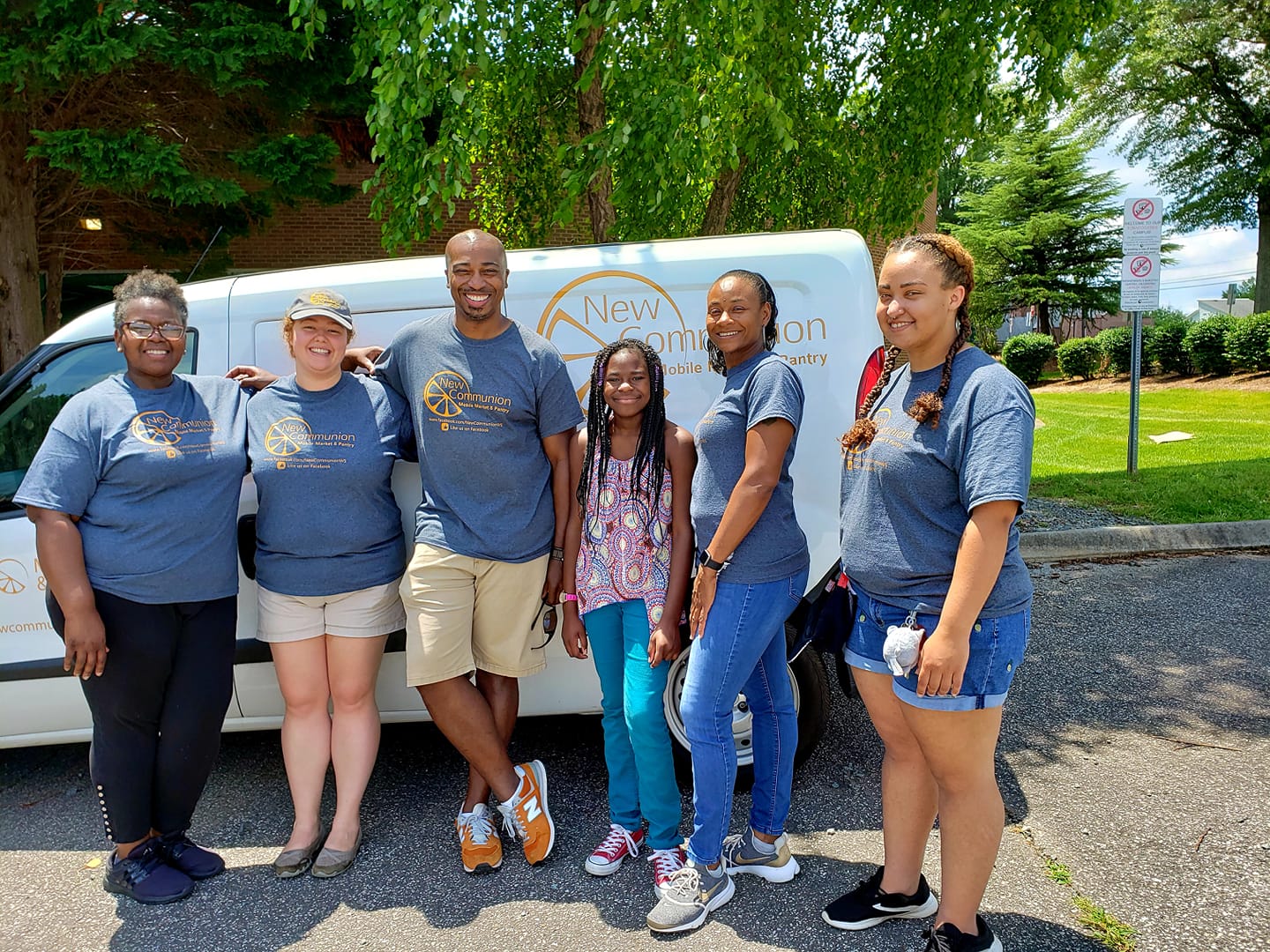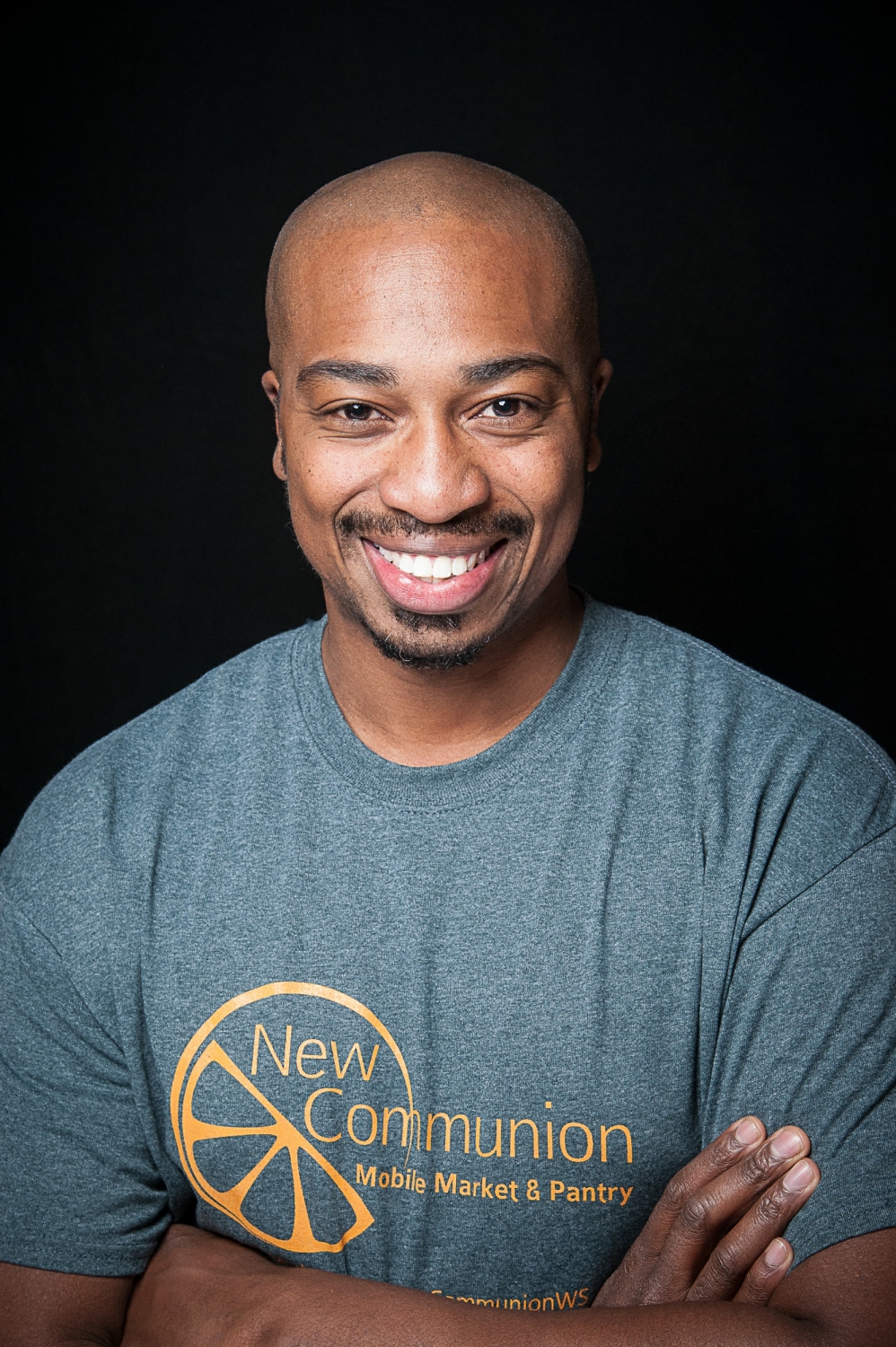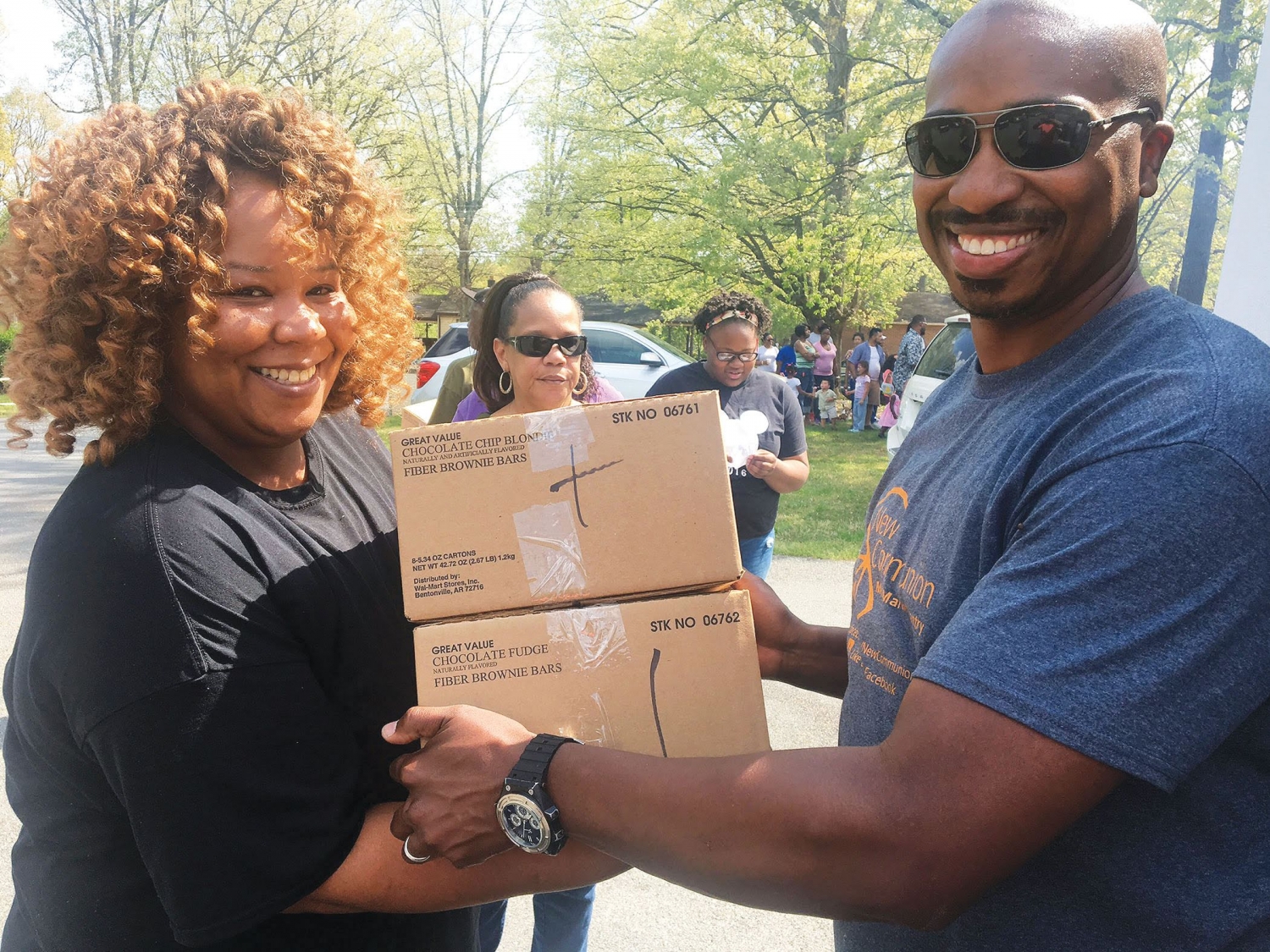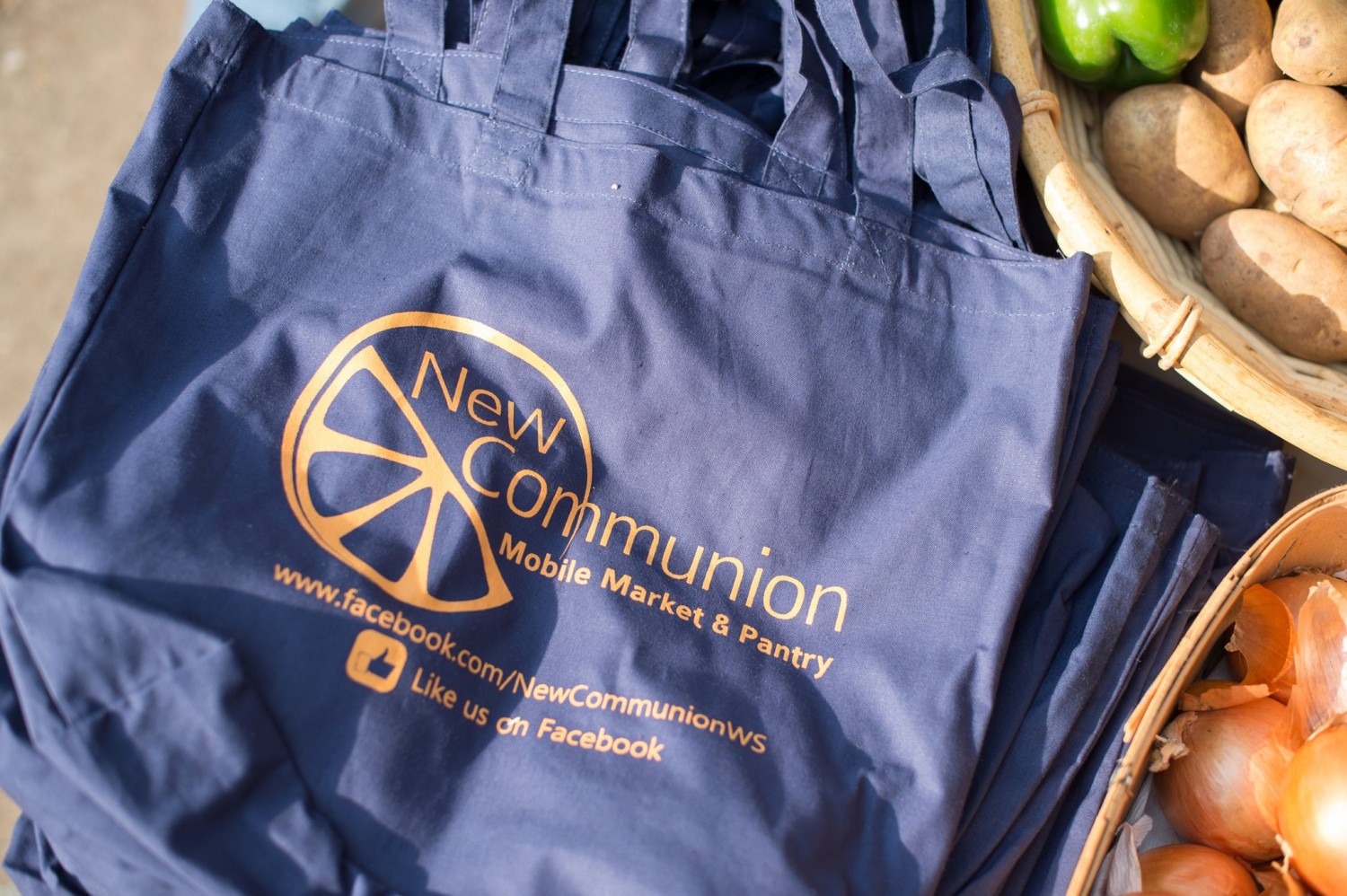Health & Social Service Partner New Communion Reflects on the Impact of Working with NBA

New Communion is a mobile market and pantry nonprofit covering the Piedmont Triad region (Winston Salem, Greensboro, and High Point) in North Carolina. Led by Rev. David Harrison, their mission is simply to feed people.
“The goal is for us to bring the Lord’s table, in essence, right to the community,” Harrison explains. “We go to the community, meeting folks right where they are. Beyond that, it’s also important for us to become a part of the community, for us to learn and glean from the community.”
The community aspect has been paramount for New Communion’s success. Early on, Harrison noticed that many food banks or community pantries run out of church buildings that weren’t mobile, making it less accessible for all community members—regardless of their transportation or mobility needs—to get food. New Communion’s food delivery truck model allows them to go into communities, often food deserts, and provide fresh produce and shelf-sustainable food without requiring any identification or paperwork. “We try not to swoop in and as if we have all the answers because the community has all of the tools that it needs, it was a community before we even got there,” he says. “We’re here to continue to empower the gifts that are there in the community, but also meet the tangible need of food.”
For the last four years, New Communion has been an Incubate Partner with NBA’s Social Entrepreneurship Program. Incubate Partnerships are one way we seek to accompany and resource social entrepreneurs in launching their organizations, anywhere from the start-up phase to nonprofits that have been operating for some years (1-10 years). Partners receive up to four years of access to professional consultants, opportunities for learning, peer support, and grant funding.
Before New Communion’s time as an Incubate Partner came to an end, Health & Social Service Partner Program Coordinator, Jerell DeCaille and Sr. Marketing Associate Brittany King spoke with David Harrison to learn more about the organization, how it’s changed throughout its partnership with NBA, and what it has meant to have the support of the organization over the last several years. Read his responses below!
National Benevolent Association: What calls you and New Communion to do the work you do?
 David Harrison: We’re called to do this work because of our commitment to the community, and also the belief that there’s a seat at the Lord’s table for everyone.
David Harrison: We’re called to do this work because of our commitment to the community, and also the belief that there’s a seat at the Lord’s table for everyone.
From a more personal perspective, I’m called to this work because I had food insecurity challenges as a child living in a town where we ranked in the top 10 every year for food insecurity. Seeing people hungry right outside of our doors is what calls us to do this work.
NBA: How did you learn about the National Benevolent Association?
DH: I want to say it was 2018 or 2019 through the SENT Seminar. At that time, I was very new to the Christian Church (Disciples of Christ). I was just getting an idea of the denomination and in in my own life. I was beginning to have a strong conviction that church is more than just what happens inside the walls of a building. To find a community like the NBA that believed in that too and who works with organizations outside of the walls of the local church, I was immediately drawn in. Being a partner with NBA allowed me to intentionally discover new ways to do this work and truly enabled me to be the hands and feet of Christ.
I got to meet NBA staff and to hear stories from different NBA partners along the way, who were completely involved with the NBA. Just seeing the work that they were doing, I was like, “Man, this is this is a group I need to be a part of!”
NBA: New Communion launched in 2016, which means you all have almost been operating for a decade! What’s been the most challenging part of the last decade or so of entrepreneurship?
 DH: I think one of the larger challenges early on was trying to garner trust. We were going into communities that we were not necessarily part of and we had to be mindful and respectful of that.
DH: I think one of the larger challenges early on was trying to garner trust. We were going into communities that we were not necessarily part of and we had to be mindful and respectful of that.
What we learned is that many nonprofits and church folks mean well. We swoop in and do these one-time things. Then, we leave. When that happens, there’s no real connection with the community. There’s no continuum. So, one of the hardest things up front was to gain trust.
The other thing is just how we do our work is unique in the fact that we don’t require folks to sign up for anything. There are no paperwork requirements. If you show up at the van, you get food regardless of whether I’ve seen you two or three times that week. There are no requirements. This area consistently ranks in the top 10 list of communities with food insecurity. We are more worried about offering you food than we are asking for your ID. If you come you get food. Why? Because everybody has a seat at the Lord’s table.
NBA: How would you describe the impact NBA has had on your organization?
DH: Wow, the impact has been phenomenal. Especially during COVID. The Executive Leaders Peer Learning & Wellness Group that I was a part of during that time really kept me going and really kept New Communion going.
I was so grateful knowing there was a group of folks that were experiencing something that nobody thought we would.
Very early on, when COVID first began, and the shutdowns were happening, I chose to stop the van food delivery for a while. After speaking with other peer group members, I learned that they weren’t stopping their work. This helped me and our team recommit to say, “Here’s what we can do in the midst of this. We are going out and we’re still gonna serve.” Things like that really kept me inspired. I can truthfully say that I don’t know if we would have continued to work if I didn’t have that peer support that NBA provided.
Outside of the peer group, everybody that I would talk to in the NBA would give me encouraging words and were always willing to help us find new ways of doing things, while also reminding us to take care of ourselves. NBA was the voice that I didn’t get inside of the church a lot. And, it was so needed. As a leader of a nonprofit and the leader of our church, I needed somebody to remind me it’s okay to take care of myself. So, I will always speak highly of NBA.
NBA: How do you think New Communion has worked to build a more just world?
 DH: We’ve allowed folks to be seen and we’ve allowed folks to share their stories. One of the most powerful things for me is getting to know people in the community. I watch them light up when they share their stories and experiences. Then, we come back two weeks later, and I’m able to check in asking, ‘Hey, how’s your cousin doing? How’s your aunt doing?” Those are powerful moments of being seen.
DH: We’ve allowed folks to be seen and we’ve allowed folks to share their stories. One of the most powerful things for me is getting to know people in the community. I watch them light up when they share their stories and experiences. Then, we come back two weeks later, and I’m able to check in asking, ‘Hey, how’s your cousin doing? How’s your aunt doing?” Those are powerful moments of being seen.
For some folks, we are their church. They see me as their leader. When we are out in their community and it comes down to spiritual things many folks seek me out. We had not planned that going into this work. We were just coming to give food. It’s those moments of being seen where community is strengthened. There have been several times when we’ll show up to hand out food, and I’m just standing there because the people we came to serve want to hand the food out and to fellowship with their community. That’s what this is all about. They know more than I do. For the community to open wide their arms for us to come in has been amazing.
To learn more about New Communion and their work, visit NewCommunion.org. Stay in touch with NBA’s work with Social Entrepreneurs by visiting NBACares.org/Entrepreneurship.